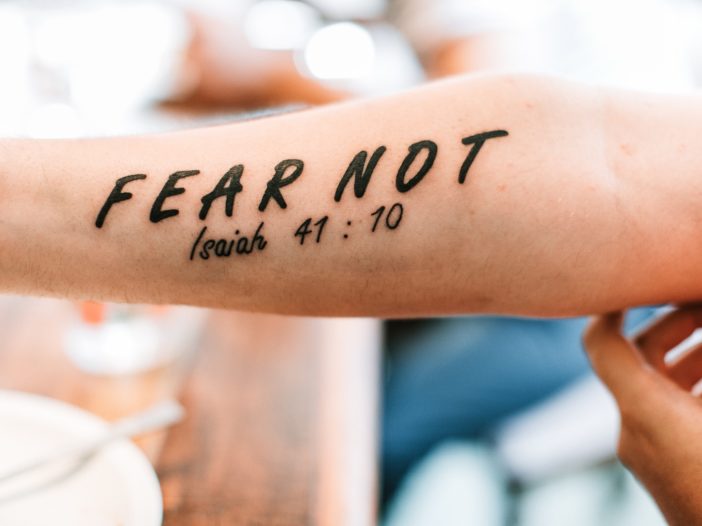
The Bible has a lot to say about fear and anxiety. In fact, some variation of “do not be afraid” is the most common directive in Scripture, occurring in some fashion more than ‘do not steal,’ ‘do not kill,’ and even ‘love your neighbor.’
How Does Anxiety Work?
When we study these constructs in research, we are understanding mechanisms through which the body/brain is informed to face a threat or danger. We can argue these responses are inherently good, with their purpose being survival, protection, and preparedness. Its activation results in the sympathetic nervous system being primed: adrenalin and noradrenalin are produced, cortisol increases, heart rate increases, blood flow moves to muscles and away from extremities, speed and depth of breathing increases, and many other physiological changes occur.[1] I’m grateful to have these responses- when they are in context. Out of context, they suck, to put it bluntly. Problems like panic attacks, worry, phobias, obsessiveness, skin/hair picking/pulling, preoccupation, social fears, avoidance, and more can be quite terrible.
One of the things I love most in my walk with Christ is context. Direction.
“The Lord is at hand; do not be anxious about anything, but in everything by prayer and supplication with thanksgiving let your requests be made known to God” (Philippians 4:5b-6, ESV).
What is being said here? Partly, “Do not be anxious about anything.” Since anxiety is a feeling of imminent threat- or in other words, it’s at hand- it’s very interesting that immediately before this phrase in Scripture we have another observation revealing a different type of imminence: “The Lord is at hand.”
In the context of the Lord being near we are told, “Do not be anxious.” This Greek word for ‘be anxious,’ μεριμνᾶτε (transliterated as “merimnate”), means to be divided and distracted, fearful, and caring for things that are out of context.[2]
Sounds a lot like those who experience anxiety disorders, right? Yep. Or even just day to day worry/anxiety? Yep. When a person feels anxiety and fear and misinterprets this as significant, a person’s entire life and values can shift to focus on whatever is the subject of their fear, whether classified medically as a disorder or not. This can lead to a preoccupation with avoiding something or someone (spiders, relationships, sex, social situations) to obsessively checking to make sure everything is okay (car, stove, locks, bodily sensations, health, perfectionistic behavior), or pursuing something (money, security, approval of others)- and MUCH more.[3]
The Supports We Often Need
To help work through these things and avoid pathological responses, I believe we need supports like therapy, help from friends, breathing techniques, mindfulness, exposure techniques, etc. This only underscores our complexity (we are “fearfully and wonderfully made”[4] yet simultaneously all messed up[5]) and highlights what we are told in Scripture about our limits.[6] We can rightly use these tools to help us, just as we do nutrition, medicine, community, and so forth. But there is one thing these tools can’t do on their own: attach us to the very God of the universe and give us a lasting hope and focus- with meaning and purpose at the highest level.
So God gives us a jewel of a passage in Philippians 4 where we are kindly reminded what our attention is to be on (context), and a little bit of how we can live it out (practice).[7] It is well known within the anxiety treatment world that even the most effective therapies (here’s looking at you, classic CBT, which I love and specialize in) often need supports to connect to larger beliefs, values, and commitments (ACT, DBT, and MI are some of the most common modalities). If we don’t connect a person to larger motivations and goals than “I just want to feel better,” it is often near impossible for a person to grow with sustainable change for the long term because they don’t have a sufficient reason and value to keep them invested. God gives us this.
- He is near (so we pray, cry out, talk to God, and work on gratitude- v. 6).
- He gives peace (that defies understanding and supersedes suffering- v. 7).
- He guards and protects us through Christ (v. 7).
Want more? Well, there’s two tips in the next two verses, Philippians 4:8-9
- Learn to focus your thoughts in ways that are true, honorable, just, pure, lovely, commendable, excellent, and worthy of praise.
- Follow someone who has practiced these things.
“Anxious for nothing” will take a lifetime to put into practice. I’m grateful to have the opportunity.
~Justin
References:
[2] Bible Hub. (n.d.). 3309. merimnaó. Retrieved July 13, 2019, from https://biblehub.com/greek/3309.htm
[3] I think it’s very important to note that we have to be very careful with saying anxiety/fear is sin- and what we mean by this. A lot of Christians get tripped up on this, and many, ironically, become more anxious. The extent of this point would likely require an entire book, so I will not take the space here to elaborate.
[4] Psalm 139:14; Genesis 1:26-27
[5] Jeremiah 17:9; Romans 3:23
[6] Psalm 73:26; 2 Corinthians 12:9-10
[7] Oh yes, there’s a whole lot more in Scripture on this topic. Let’s not reduce a couple sentences into a “how-to-manual.”








Leave a Reply